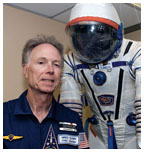
|
June 6, 2007: A moment with...
(Photo by Beverly Schaefer) |
Greg Olsen
Full-time businessman and part-time astronaut Greg Olsen has been on campus this spring as the first entrepreneur-in-residence in the School of Engineering and Applied Science. Olsen is a co-founder of Sensors Unlimited, which designs optical equipment for NASA. In 2005, he spent 10 days at the International Space Station as one of the first private citizens to journey into space. Olsen spoke with PAW’s Mark F. Bernstein ’83.
What does the entrepreneur-in-residence do?
Once a month, I have office hours and anyone can come talk to me about anything they want that’s related to starting a business: how to file a patent, how to incorporate, and so forth. Primarily, students are coming to me. We are also hosting something called “Meet the Entrepreneurs.” I try to get a dozen proven entrepreneurs who have successfully started businesses. I give a brief introduction and then let people go around and talk to them, like at a big cocktail party.
Are entrepreneurs born, or are they made?
I lean toward thinking that an entrepreneurial spirit is something you’re born with. You need to have the fire inside you. Without that, there is no amount of teaching that will bring it out. But a guy doesn’t become a good golfer, say, unless he has good coaches who move him along. For entrepreneurship, I think it’s less about talent as we normally think of it and more about drive.
How would you describe the entrepreneurial spirit of Princeton students you have dealt with?
It’s surprisingly evident. But I don’t proselytize. I don’t tell students they should do this. I just tell them it is another option in life. Some people like to do it; some people don’t. It used to be that if you got a Ph.D., your options were that you could teach or go to work for a government lab. Now you can also start a company.
What are the essential characteristics of a good entrepreneur?
The central one is that hunger, that drive. Being smart? It helps, but it’s not absolutely necessary. I never considered myself the smartest kid in any of my classes, by any means. But you have to want it, because there are going to be thousands of reasons why you can’t do it, and the successful entrepreneurs will overcome them all.
Has the University always been supportive of private business ventures?
From the time I co-founded Sensors Unlimited in 1992, I found Princeton very open. Now, 25 or 30 years ago, that wasn’t as true. I worked at RCA Laboratories in the 1970s and early ’80s, and I would say that Princeton then had more of a reputation of being an ivory tower that wasn’t as interested in industry. That’s really changed, and Shirley Tilghman, in particular, has been very supportive of having the University interact with industry.
What was it like to go into space?
After the birth of my two daughters, it was the most wonderful thing that has ever happened to me. I grew up with the space race and always thought that flying in space was for the lucky few, like playing first base for the Dodgers, which was another thing I wanted to do. It was always a dream of mine, and there I was at age 60 and I finally got to go into space.
Why did you want to go?
I had three reasons. One, of course, was just to experience the thrill of going into space. Second, I wanted to do some scientific experiments. And third, I wanted to share my experiences with others. I’ve given over 230 talks at middle schools. My goal is to get more American kids into science and engineering. So if I have to put on my flight suit and play spaceman for a day, I’m willing to do that.
Do you think private space flight will become more common?
Certainly suborbital flights will become more common. For orbital flight, you do need some training — you need to know what to do. I trained for six months. Orbital flights also cost millions of dollars, and I don’t see that cost coming down. But I can see suborbital flight coming down to the $50,000 range, and people spend more than that on cars. There’s a lot of private space work going on now. There are at least six companies that are working on vehicles for suborbital and even orbital flight.
Many have argued that it is more cost-effective to send unmanned vehicles into space. What is the case for manned space flight?
You always want to be there. You can do a lot of things on unmanned
missions, and I’m all for that, but there’s an element inside
us that wants to explore things. Fifty or 100 years from now, we may have
to get off the planet. If the environment takes a turn for the worse,
who knows, we may need other areas to live. So I believe there is always
a role for manned flight. ![]()

